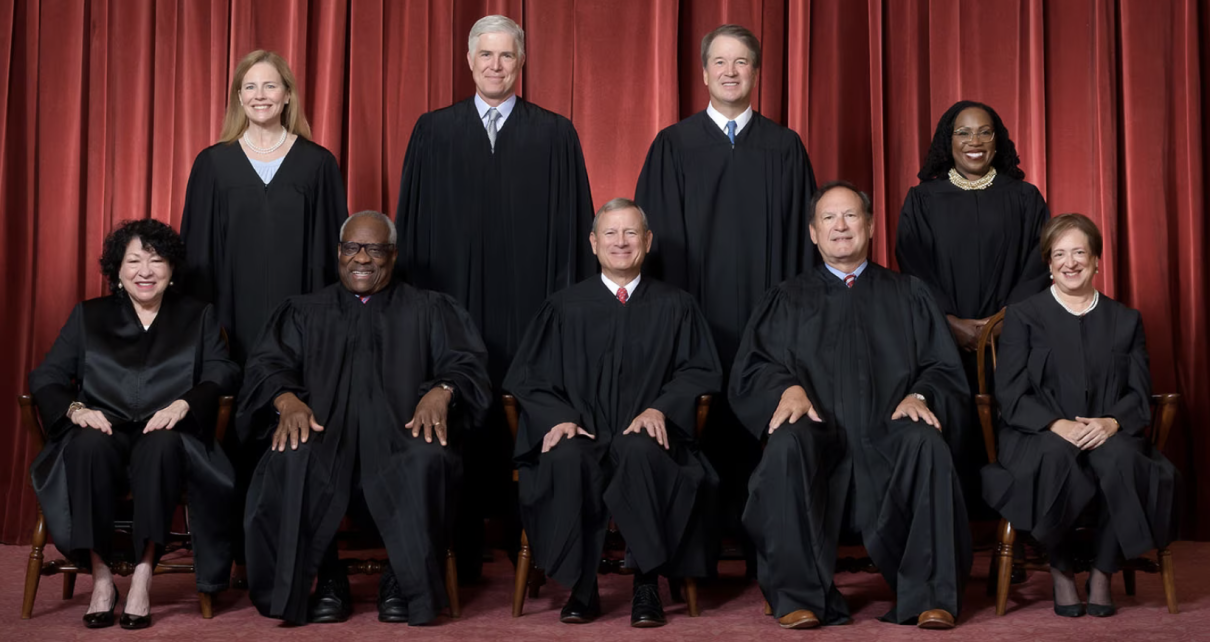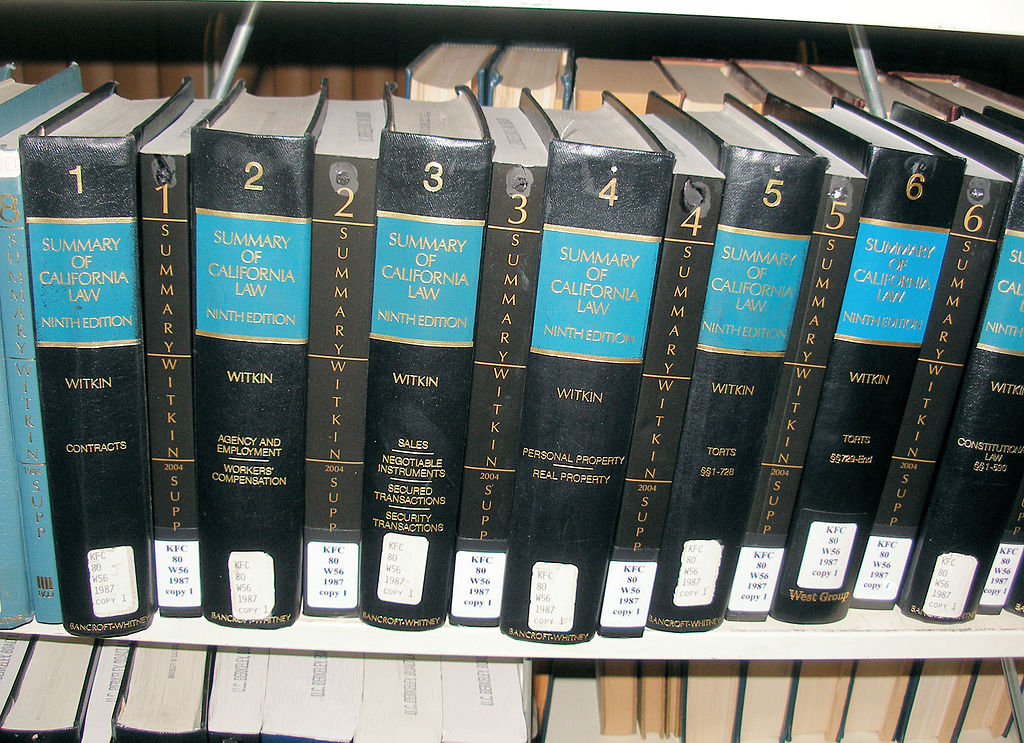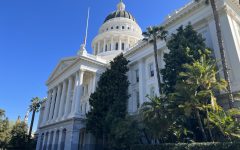
Justices of The U.S. Supreme Court. (Photo: supreme court.gov)
Supremes Kneecap Administrative State
‘The heyday of administrative fiat and overreach is over’
By Thomas Buckley, June 28, 2024 1:40 pm
The United States Supreme Court today threw out 40 years of precedent and overturned the principle of Chevron deference, blowing a huge hole in the power of the administrative state.
In a 6 to 3 ruling (Justices Kagan, Sotomayor, and Brown Jackson dissented,) the court held that courts do in fact have a role to play when there is a dispute of the interpretation of federal regulatory law.
For the past four decades, the doctrine known as “Chevron deference” (called that because the company was involved in the original case) has said that if there is an issue – such as a lawsuit – with a federal regulation, courts must in the end “defer” to the opinion of the agency “experts” who crafted the law.
In his supporting opinion, Associate Justice Neil Gorsuch explained the concept thusly:
“When applying Chevron deference, reviewing courts do not interpret all relevant statutory provisions and decide all relevant questions of law. Instead, judges abdicate a large measure of that responsibility in favor of agency officials. Their interpretations of “ambiguous” laws control even when those interpretations are at odds with the fairest reading of the law an independent “reviewing court” can muster,”
In other words, if a regulatory agency decides the details of a law passed by Congress are not clear or exact enough it could then interpret them as it saw fit and the poor guy being regulated essentially had almost no recourse to the courts.
That is no longer the case.
At specific issue before the court was whether or not a government agency could not only require that an observer be on a fishing boat but also that the boat owner pay for said government overseer. The clear administrative overreach was enough to get the case – after failing to convince lower courts they shouldn’t have to pay for their own regulator – all the way to the supremes.
“Today’s decision vindicates the rule of law. By ending Chevron deference, the Court has taken a major step to preserve the separation of powers and shut down unlawful agency overreach,” said Roman Martinez of Latham and Watkins law firm, which represented one of the two (there were two boats involved) in the case. “Going forward, judges will be charged with interpreting the law faithfully, impartially, and independently, without deference to the government. This is a win for individual liberty and the Constitution.”
The dropping of Chevron deference was immediately and vociferously criticized by those who have benefitted directly from such administrative overreach. Hardcore environmental activists, safety mavens, and every other form of “we know better than you, stupid public” group criticized the decision.
In a suitably aghast piece by the Associated Press, that sentiment was clear:
The ruling will likely “gum up the works for federal agencies and make it even harder for them to address big problems. Which is precisely what the critics of Chevron want,” said Jody Freeman, director of the environmental and energy law program at Harvard Law School… (and) Dustin Cranor of Oceana, another conservation group, said the case “just the latest example of the far right trying to undermine the federal government’s ability to protect our oceans, waters, public lands, clean air and health.’’
Yup – we’re all going to burn or freeze or starve or overeat ourselves to death now – it’s a guarantee.
In her dissent, Associate Justice Elena Kagan said Congress is incapable of writing complete and comprehensive regulatory rules into every new law and that it should be left to the government “experts” to flesh out the blank spots and/or alleged ambiguities.
“…(b)ecause agencies often know things about a statute’s subject matter that courts could not hope to. The point is especially stark when the statute is of a ‘scientific or technical nature.’”
During oral arguments, Kagan said essentially the same thing – let the experts handle it.
But leaving omniscient interpretive power in the hands of a bureaucrat tends not to work out terribly well: See Dr. Anthony Fauci, Dr. Deborah Birx, and Dr. Francis Collins RE: COVID.
And see the deserved devastation of the public trust in the entire expert class over the past five or six years. Kagan’s “trust the experts” argument may have seemed plausible in 1984, but in 2024 is ludicrous.
Michael Lotito, Co-Chair of the Workplace Policy Institute in San Francisco was very pleased the court overturned Chevron. “It’s a big day for the rule of law,” Lotito said. ‘The heyday of administrative fiat and overreach is over.”
Lotito added the ruling should send a clear signal to Congress to start “passing laws with real clarity” as to their enforcement.
While the ruling covers all federal activity here in California, it – sadly – does not automatically cover state regulators. Chevron was overturned in part because it didn’t jibe with a federal law known as the Administrative Procedure Act. The Act set standards for public input, clarity, and consistency in rule making and in defining the scope of judicial review.
California has a similar APA and has practices that can, in part, be said to partly mimic Chevron, but not exactly.
For California to gain the same broad freedoms from regulatory overreach that the feds must now offer, the state Supreme Court would have to get involved.
And that – the supreme court limiting the state bureaucratic blob – said Lotito, is highly unlikely to occur.
I mean really really really highly unlikely to occur.
Note – this ruling does NOT impact any case in the past 40 years that has relied on Chevron: “By overruling Chevron, though, the Court does not call into question prior cases that relied on the Chevron framework. The holdings of those cases that specific agency actions are lawful—including the Clean Air Act holding of Chevron itself…”
- Benefit Fraud Problems and Solutions - November 7, 2024
- A Little Exit Poll - November 5, 2024
- Tomorrow’s Headlines Today! - November 5, 2024





Bravo to the six justices for this excellent decision.
YESSSS!